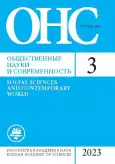Public Opinion in Armenia on the Greater Russian Space Before and After the Second Karabakh War
- Authors: Manukyan S.A.1
-
Affiliations:
- Yerevan State University
- Issue: No 3 (2023)
- Pages: 109-130
- Section: Postsoviet space
- URL: https://journals.eco-vector.com/0869-0499/article/view/675191
- DOI: https://doi.org/10.31857/S0869049923030085
- EDN: https://elibrary.ru/GIPCCF
- ID: 675191
Cite item
Abstract
The problem of Armenia’s geopolitical choice in the context of world-system analysis and the history of Armenia in the 20th and early 21st centuries is considered. It is concluded that geopolitical configuration in Transcaucasia today and 100 years ago are similar, and said similarity determines an adequate geopolitical choice for Armenia in modern conditions - integration with the Greater Russian space. The dynamics of attitudes in Armenian society towards Russia as the best ally of Armenia, and France as the main competitor of Russia during 2011-2022 is given. In this context, the impact of the 44-day Karabakh war on attitudes towards the Greater Russian space is estimated. The analysis is based on two indicators - the attitude towards the USSR and the attitude towards Armenia’s accession to the Union State of Russia-Belarus. The systems of argumentation of supporters and opponents of the USSR are identified, as well as their transformation after the 44-day war and the factors influencing the attitude of society towards the Greater Russian space. Armenian society was segmented into pro-Russian, pro-Western, mixed, and not having an accentuated orientation sectors. An assessment of the sizes of these segments, as well as a comparative analysis of their main characteristics was carried out. These characteristics include (but not limited to): the level of loyalty to the country’s political course, electoral participation, information preferences, trust in state and public institutions. The presented empirical material was obtained by secondary analysis of the databases of nationwide representative sociological surveys “Caucasian Barometer” for 2011-2022, carried out by the Caucasus Research Resource Centers. The results of other sociological surveys are also presented.
About the authors
Samvel A. Manukyan
Yerevan State University
Email: samvelmanukyana@gmail.com
Erevan, Republic of Armenia
References
- Ананьев А.В. (2021а) Внутриполитическое положение в Армении после карабахского конфликта // Международная жизнь. № 2. С. 94-111. (https://interaffairs.ru/jauthor/material/2470).
- Ананьев А.В. (2021б) Армянский информационно-политический разлом // Общественные науки и современность. № 1. С. 145-156. doi: 10.31857/S086904990013998-9.
- Атанесян А.В. (2018) "Бархатная революция" в Армении: потенциал, достижения и риски политико-протестной активности // ПОЛИС (Политические исследования). № 6. С. 80-98. doi: 10.17976/jpps/2018.06.06. (https://www.politstudies.ru/article/5463).
- Атанесян А. В., Мкртичян А. Е. (2022) Армения между Россией и Западом: внешнеполитические приоритеты в общественном мнении // Социологические исследования. № 12. С. 88-100. doi: 10.31857/S013216250022088-9.
- Валлерстайн И. (2000) Глобализация или переходный период? // Экономические стратегии. № 2. С. 14-26.
- Валлерстайн И. (2001) Анализ мировых систем и ситуация в современном мире. Пер. с англ.: П. М. Кудюкин. СПб.: Издательство "Университетская книга". 416 с.
- История Армении. С древнейших времен до наших дней. Учебник для вузов (2012) Ред.: Г. Р. Симонян. Ереван. 874 с.
- Купряшкин И. В. (2019) Накануне гегемона? Мир-системный подход к перспективе глобального лидерства КНР // Вестник Бурятского государственного университета. Философия. Вып. 4. С. 32-42. doi: 10.18101/1994-0866-2019-4-32-42.
- Махмурян Г. (2022) Об отказе Османского правительства от Батумского договора 1918 г. // Вестник общественных наук. Национальная академия наук Республики Армения. № 3. С. 9-27. doi: 10.53548/0320-8117-2022.3-9.
- Мозолев К.И. (2018) Глобальная гегемония Китая: реальность и перспективы // Juvenis scientia. Юридические науки и политология. № 4. С. 20-25.
- Ованнисян Р.Г. (2007) Международные отношения Республики Армения, 1918-1920 гг. Пер. с англ.: Г. Г. Махмурян. Ин-т истории НАН Армении; Кафедра современной армянской истории Калифорнийского ун-та Лос-Анджелеса. Ереван: Тигран Мец. 912 с.
- Фишман Л. (2021) Достойный гегемон "испорченного" мира // Россия в глобальной политике. № 4. doi: 10.31278/1810-6439-2021-19-4-98-110.
Supplementary files











